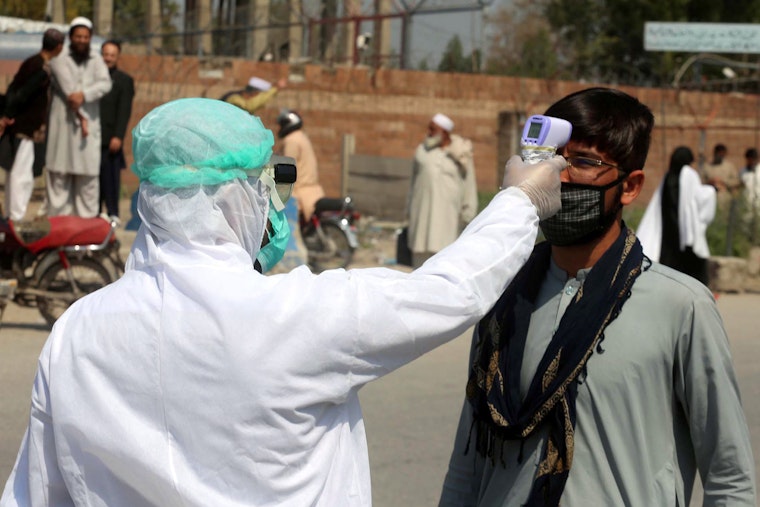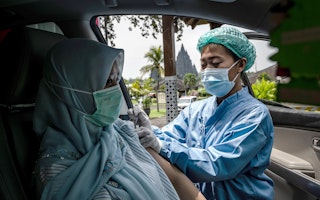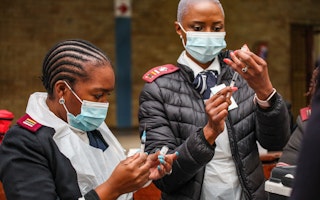Fighting the Pandemic in Pakistan’s Prisons
By Parveen Azam Khan

When the COVID-19 pandemic first swept Pakistan earlier this year, many feared that the country’s prisons were a ticking time bomb. Overcrowded and long-neglected, with prisoners packed like sardines in deplorable conditions, jail cells seemed like fertile breeding grounds for the virus.
Thankfully, no mass outbreaks have taken place so far, not least because of heroic efforts by civil society groups. But the scare has exposed something else: the urgent need to reform the Pakistani judicial system that today overwhelmingly punishes the country’s poorest.
Khyber Pakhtunkhwa, the mountainous province that straddles Pakistan’s western border with Afghanistan, is a case in point. Khyber Pakhtunkhwa has the highest poverty rates in Pakistan, and has been home to millions of refugees since the Soviet invasion of Afghanistan in 1979.
The war fueled the illicit economy and turned Khyber Pakhtunkhwa into one of the world’s main transit hubs for Afghan opium. The easy availability of drugs has taken a devastating toll on the local population, with addiction rates skyrocketing, including among young people and children.
This is how the idea for my organization, the Dost Welfare Foundation, which I more commonly refer to as “DOST,” came about. We wanted to help the most vulnerable in Pakistan—those so far on the margins of society that many do not even consider them human.
I established DOST in 1992, after retiring from three decades of government work as a medical doctor. I called it “DOST” after my father, whose name appropriately also means “friend” in the Pashto language. In fact, when I was 14 years old, my father made me promise him that I would use my training to benefit the poorest of the poor.
We have spent the past decades providing aid, counseling, and legal services to tens of thousands of people in our province. We believe in the concept of a therapeutic community, where those we help eventually join us in helping others.
One remarkable example of this is Afzal, who was one of the first drug addicts who came to us as a patient in the early 1990s. Today, he is the head of our street children outreach program, and spends his nights scouring Peshawar for children who use drugs and need our help.
While we started out working with addicts on the streets, we gradually followed them into the prisons, since that is where so many eventually end up. In fact, according to some studies, close to 70 percent of all prisoners in Khyber Pakhtunkhwa today have been arrested on drug charges.
When news of the pandemic spread earlier this year, it was clear inmates would be especially at risk. This is not least because prisons are dangerously overcrowded. The national prison population is 77,275—far above the actual capacity of 57,742. In most jails, access to medical care is inadequate, with thousands of prisoners suffering from chronic, contagious diseases, even before COVID-19.
We worked on several fronts to prevent COVID-19 from spreading, with our efforts funded by the Foundation Open Society Institute—Pakistan. We supplied personal protective equipment, sanitizer and other aid to a total of 21 prisons across Khyber Pakhtunkhwa.
Crucially, we also worked with prison staff directly so they could better protect themselves, providing training and equipment like thermal guns and masks. Separately, we continued legal aid to prisoners, pushing for the early release of those most at risk.
Our medical expertise, resources, and long-established relationship with local government officials allowed us to act quickly. With local authorities underfunded and under-resourced, they welcomed aid from civil society groups. Thankfully, these efforts seem to have worked, as not a single case of COVID-19 has been detected in Khyber Pakhtunkhwa prisons to date.
But while we seem to have avoided a short-term disaster, COVID-19 has exposed longer term issues in the justice system that must be addressed.
Pakistan’s overcrowded prisons are no accident, but a result of a notoriously slow-moving judiciary. More than half of all inmates in Pakistan have not been convicted but are still waiting for their trials to start. Many have languished in prisons for years at a time. There is an urgent need to reform the judiciary to address this backlog, and to put measures in place that allow for the responsible early release of some prisoners.
There is also a pressing need to address skyrocketing drug use, one of the main causes of high incarceration rates. Pakistan has among the highest drug use rates in the world. In Khyber Pakhtunkhwa alone, the UN estimates that some 10.7 percent of the population abuse drugs—more than twice the already-high national average.
But organizations like ours can only do so much on their own. We need more support and resources for programs to treat addiction and address its root causes, both from the government and from international donors. I hope that COVID-19 will be a wake-up call to tackle these issues head on. The people of Khyber Pakhtunkhwa, and Pakistan as a whole, deserve no less.
Dost Welfare Foundation is a grantee of the Open Society Foundations.
Parveen Azam Khan is the founder and chief executive of Dost Welfare Foundation.


